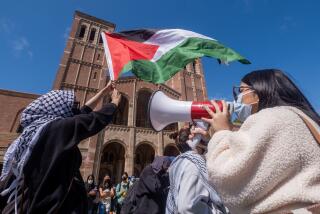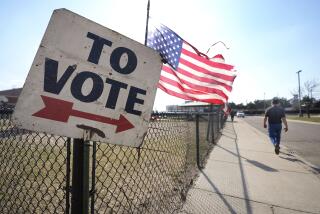Lebanon Assault Alienates Arab Israelis
- Share via
JAFFA, Israel — When Nadia Hilou opted to run for parliament on the governing Labor Party ticket, it seemed that the Arab educator’s campaign among Palestinians in Israel would be as easy as the warm breeze wafting in here from the Mediterranean.
Israeli Prime Minister Shimon Peres was seen as “Mr. Peace” by most of the 800,000 or so Arab citizens of Israel. He was an architect of the Israeli-Palestinian peace accord who would end, once and for all, the painful conflict between their people and their state.
After the assassination of Prime Minister Yitzhak Rabin by a radical Jew opposed to the peace process, pollsters were predicting that Arabs would turn out to vote in unprecedented numbers and that 90% of them would cast ballots for Peres.
Then Mr. Peace made war.
Israel’s two-week “Operation Grapes of Wrath,” aimed at Shiite Muslim guerrillas in Lebanon who had been firing rockets at northern Israel, has driven a wedge between Peres and Arab Israelis. The killing of about 150 Lebanese Arabs, most of them civilians at a U.N. refugee camp in Qana, has caused Labor support in the Arab sector to plummet. And it has raised an uncomfortable hurdle for Hilou, Labor’s highest-profile Arab candidate and the only Arab woman running for the Israeli legislature, the Knesset.
“We are passing through a hard period. What happened at Qana was a tragedy that hurt the Arabs. I was hurt. I am sorry for the women and children victims,” she said in an interview. “But Peres was the man of peace, and he continues to be. A decision should not be made on one act.
“We have three weeks until the election, and I am very confident in the Arabs from all parties to distinguish between their feelings and their reason. Their heads will tell them to vote for Peres.”
Hilou may be overconfident. Polls since the military offensive show that only 47% to 52% of Arab voters support Peres in the first direct election for an Israeli prime minister. Many Palestinians say they will cast blank ballots in the race between Peres and right-wing Likud Party leader Benjamin Netanyahu--a race so tight that every vote counts.
Arabs in Israel say they are angry not only over Lebanon but over the 2 1/2-month Israeli closure of Palestinian-ruled territory in the West Bank and Gaza Strip.
Peres imposed the closure for security reasons after a spate of suicide bombings in Israel by the militant Islamic group Hamas began Feb. 25, killing more than 60 people. Arabs inside and outside Israel, however, consider it unfair collective punishment.
“We always gave Peres our support, and now he is stepping on the Arabs,” said Mohammed Abdel Fattah, 45, a restaurateur who has voted Labor previously. “I will vote with a blank paper. What Peres is doing now is taking the same measures that Likud took in the past, so it doesn’t matter who is in power.”
Spotting an opening, Likud’s Netanyahu has been wooing voters with visits to Arab towns such as Taiyiba, where he spent the recent Muslim Feast of the Sacrifice, to put forth his new position on the peace accord--that whatever has been done already is done and that he will not send Israeli troops to reoccupy Palestinian towns in the West Bank and Gaza.
Netanyahu now also says he would be willing to talk to Palestinian leader Yasser Arafat, even though his campaign ads portray Arafat as untrustworthy.
Arafat has made no secret of his desire to see Peres remain in the office the prime minister inherited from Rabin. The Palestinian Authority president went so far as to persuade the leadership of his Palestine Liberation Organization to annul its decades-old call for the destruction of Israel--in the midst of the closure and the Lebanon operation.
Moshe Arens, who heads the Likud campaign in the Arab sector, insists that Arafat’s open support for Peres is no obstacle for Netanyahu.
“There are many Israeli Arabs who don’t admire Arafat. The Arab population in Israel has gotten used to democracy, and I don’t believe that Arafat’s regime appeals to them,” he said.
Arens said Likud’s argument to the Israeli Arabs is: “The best way to make peace is to make sure that Israel is strong.” He says Likud is a champion of equal rights for Arabs.
Labor challenges the sincerity of Likud’s campaign to win over Arabs, pointing out that Likud leaders branded parliamentary approval of the peace accord “illegitimate” because it depended on Arab votes. Likud members have argued that Arabs should not be allowed to vote on fundamental questions of sovereignty, borders and Jewish issues.
“Netanyahu and the Likud acted systematically to de-legitimize the Arab vote in the Knesset,” said Haggai Merom, a Labor member of parliament. “One who objects to having Arabs in the Knesset cannot tell them today how much he wants equality for them.”
Labor leaders hasten to note that the one candidate on the Likud ticket representing the Arab Druze sect was dropped after Likud made an alliance with two right-wing parties, Tsomet and Gesher, and cut deals over seats.
But it is Labor, not Likud, that stands to lose the most in the Arab sector, since this vote traditionally has helped Labor.
Hilou is doing her best to ensure it will again. The daughter of a large Christian family from Jaffa with four girls of her own, Hilou, 42, moves through her hometown in a swirl of activity, shouting hellos left and right with a reporter by her side and a German television crew trailing behind.
She carries a briefcase in one hand and a cellular telephone in the other, answering questions in a jumble of Hebrew and Arabic. She was elected No. 37 on Labor’s list of parliamentary candidates in the party primaries, meaning she is virtually guaranteed one of the Knesset’s 120 seats.
Hilou is trying to rally the 440,000 eligible Arab voters with her use-your-head argument. She tells constituents that to abstain from voting is to abdicate a civil right for which Arabs in Israel have fought hard. To cast a blank ballot is to indirectly support Netanyahu, she says. And she stresses the distinction between the peace process and equality for Arabs in Israel.
About 150,000 Arabs remained in Israel after the founding of the Jewish state in 1948, while most others fled or were forced out. Today the Arabs represent about 15% to 20% of the population of Israel, and slightly less of the eligible voters.
They have long been caught between Palestinians who dislike their ties to the Jewish state and Jews who distrust their family ties to Israel’s old enemies.
Many political activists argue that only peace can eliminate the perception of Arab Israelis as a fifth column in the Israeli-Palestinian conflict. Only with peace, they say, can Palestinians put aside the struggle of their brethren in the West Bank and Gaza and focus on their problems at home.
As director of Jaffa’s Hirsch Center, which provides health, education and welfare services to Jewish and Arab children, Hilou is familiar with many of those problems.
“Arab people in Israel have social problems, daily problems of education, housing, problems with their children and with academic work and the economy. In this field, I can try to help,” she said. But, she added, the government has to help too by taking steps to win back the Arab vote.
Peres is trying. He announced last week that he would “consider” appointing the first Arab Cabinet minister in Israeli history. He is scheduled to meet today with leaders of the small Arab parties that support his coalition government. The question is what, if anything, he will offer them.
“The situation is very fluid right now,” said Elie Rekhess, a senior researcher at the Dayan Center at Tel Aviv University. “What happens between now and election day will determine what the Arab vote will do.”
The Arabs’ wish list is long, Rekhess said. They want Labor to offer them a plan to close budget gaps between Jewish and Arab communities and give them administration of lands in Israel owned by the trust that oversees Islamic holy sites and other properties. They expect Israel to quit dragging its feet on the agreed return of Arabs to the northern villages of Ikrit and Biram, whose inhabitants were evacuated by the Israeli army in 1948 and which were then razed. And they want about 60 Israeli Arab prisoners released from jail.
In the West Bank and Gaza, they want Peres to lift the closure on their Palestinian brothers.
“Peres is caught in a difficult dilemma. He must compromise in a form that will keep the Arabs satisfied. . . . At the same time, his position must not be overly open to criticism by his Jewish constituency,” Rekhess said.
But many Arab Israelis feel they are the ones eternally caught in the middle.
“This is the Arab Israelis’ reality. We have the pain from both sides. When there is a bus bombing [in Israel] we feel it, and when something happens on the Arab side like Lebanon we feel it,” Hilou said. And the only cure for that, she said, is “peace and equality.”
More to Read
Sign up for Essential California
The most important California stories and recommendations in your inbox every morning.
You may occasionally receive promotional content from the Los Angeles Times.













